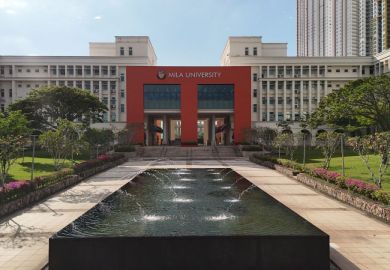Persuading the Uruguayan government to break with convention and allow the creation of a new university was, to put it bluntly, “difficult”, according to Andrés Lalanne. But the rector of the Latin American Center for Human Economics (CLAEH) was justifiably proud last year when, 60 years after its creation, the institution was formally recognised by the state.
This may sound small fry from a global perspective, but CLAEH, a private institution situated in the capital, Montevideo, is special in that it is the first new university to win official recognition in Uruguay for 10 years, and only the country’s seventh overall. As such, Dr Lalanne has been described by his contemporaries as something of an entrepreneur for education and research.
“Many people thought we would fail,” he told Times Higher Education. “It was an ambitious project and their main concern was sustainability, because there is no public funding for this kind of institution.”
Thanks to support from the international community, CLAEH is now an established research and teaching institution, as well as one of Uruguay’s most respected thinktanks. The university boasts three faculties – in medicine, law and culture – and the rector hopes to expand further in the years to come, notwithstanding the huge challenge involved, he explained.
Despite having gained institutional autonomy in the early 1990s, CLAEH – like all private universities in Uruguay – is subject to strict governmental control, a hangover from the country’s 12-year military dictatorship, which ended in 1985.
“It makes innovation difficult, because we have to communicate any change in the curricula, ideas for new projects, things like that,” Dr Lalanne said. “But at the same time, I am sure we are making a good contribution to the public system, so it makes no sense [for ministers] not to support us.”
A chemical engineer by trade, Dr Lalanne assumed the leadership in 2011, and with it he adopted the vision of CLAEH’s founding members to “rehumanise” healthcare in the region.
CLAEH’s first undergraduate school, the Faculty of Medicine, was launched in 2006 as only the second medical school in the country. The project was risky, but it ultimately paid off, something that Dr Lalanne attributes to a humanist approach that “challenged traditions and reinforced kindness in medical care”.
Traditional healthcare, the medical school’s mission statement boldly claims, has become “cold, mediated and impoverished”. It is Dr Lalanne’s belief that by teaching “kindness and patience” through the medical curriculum, social mobility can be improved for the whole of the country.
As is the case in many Latin American countries, public universities are both free to attend and have no cap on numbers, resulting in a student population that is “millions too many”. Through scholarship schemes, Dr Lalanne said, CLAEH can help to ease that burden, although progress is slow when every decision must be agreed by the state.
In spite of these challenges, the rector insisted that there was a “good reason” for keeping such a heavily regulated system. “A lot of universities in Latin America that were created in the past decade have become business models, without any care for quality of teaching,” he explained. “In order not to repeat that pattern here, we have made it very difficult to become a university.”
Education leaders in many countries economically similar to Uruguay chastise their governments for allowing an influx of private companies that dole out degrees of questionable quality. Uruguay, however, has a model that differs from most in that there is no separate accreditation system for degrees. Everything is centralised and every qualification is awarded not by the universities themselves but rather by the Ministry of Education and Culture.
In a way, Dr Lalanne said, this governmental oversight of degrees not only encourages institutions to provide a high quality of teaching, but it also relieves them of a certain amount of bureaucracy, allowing them to concentrate on other concerns, such as research.
Increasing interest from international organisations – the likes of which helped CLAEH in its foundation 60 years ago – will help to give the institute the financial stability it cannot secure from tuition fees alone. Ultimately, however, Dr Lalanne must play a patient game in winning trust from a government that remains wary.
But he and the university have decades of experience of slowly and steadily advancing on their goals. The rector is in no rush. “The important thing is not to grow too much too soon, but to retain positive results. This is how we will prove we are committed to human development for all the right reasons,” he concluded.
POSTSCRIPT:
Print headline: State controls help steady Uruguayan sector, says rector
Register to continue
Why register?
- Registration is free and only takes a moment
- Once registered, you can read 3 articles a month
- Sign up for our newsletter
Subscribe
Or subscribe for unlimited access to:
- Unlimited access to news, views, insights & reviews
- Digital editions
- Digital access to THE’s university and college rankings analysis
Already registered or a current subscriber?








